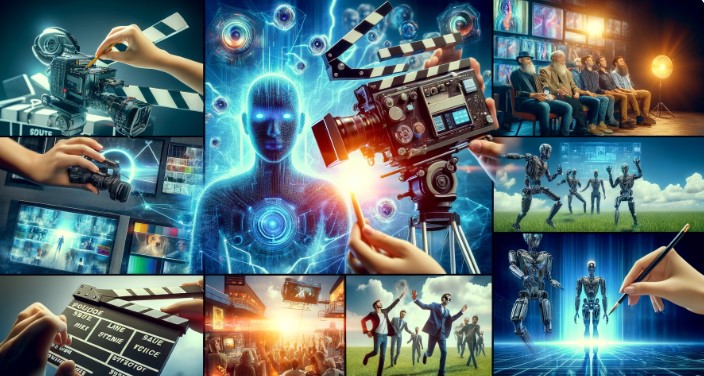The Impact of AI and Technology on Film Production

- Country:
- United States
Spoiler Alert: This article contains spoilers. Proceed with caution if you have not watched the show/movie.
Artificial intelligence (AI) and technology are reshaping the film industry in unprecedented ways. From scriptwriting to post-production, the integration of AI has introduced new efficiencies and possibilities, while also raising significant challenges.
Transforming Scriptwriting and Pre-Production
AI's influence begins at the scriptwriting stage. Traditional scriptwriting is a lengthy and labor-intensive process, often taking months or even years. However, AI tools are now capable of analyzing successful scripts and generating new content. This technology helps writers develop plotlines, characters, and dialogues that resonate with audiences. According to a study by researchers at the University of Southern California, these AI algorithms can identify patterns in successful movies, providing writers with valuable insights that speed up the development process and enhance creativity.
In pre-production, AI is revolutionizing budgeting, scheduling, and location scouting. Filmmakers use AI tools to predict costs and optimize shooting schedules. AI algorithms analyze historical data to forecast expenses and suggest ways to stay within budget. This predictive capability is invaluable in an industry where budgets can easily spiral out of control. Additionally, AI-driven tools help find the perfect filming locations by analyzing geographical and logistical data, saving filmmakers significant time and resources.
Enhancing Production and Post-Production
During production, AI technologies significantly enhance visual effects (VFX) and animation. AI-powered software automates repetitive tasks, leading to significant time savings and improved quality. For instance, AI can create realistic CGI characters and environments, reducing the need for extensive manual labor and post-production work. This technology not only enhances the visual appeal of films but also allows for more creative freedom by enabling filmmakers to achieve effects that were previously impossible or too costly.
Post-production is another area where AI is making a substantial impact. Editing, a traditionally time-consuming process, is now more efficient thanks to AI tools that can automatically sort and categorize footage. These tools help editors quickly find the best shots and streamline the editing process. AI also aids in color correction, sound editing, and adding special effects, ensuring a polished final product. Some AI technologies are even capable of generating high-quality trailers by analyzing the most exciting and engaging parts of a film, further reducing the workload on human editors.
Also Read: Why Traditional Art Still Inspires Modern Artists
Revolutionizing Marketing and Distribution
AI is not only changing the way films are made but also how they are marketed and distributed. By analyzing audience data, AI can predict box office performance and tailor marketing strategies accordingly. This data-driven approach allows studios to target their advertising more effectively, reaching the right audiences and maximizing revenue. Personalized recommendations and targeted advertising are now common, thanks to AI's ability to analyze vast amounts of data quickly and accurately.
Addressing Challenges and Ethical Considerations
Despite the numerous benefits, the integration of AI in film production is not without challenges. One significant concern is job displacement. As AI takes over tasks traditionally performed by humans, there is a fear that many jobs in the film industry could become obsolete. Furthermore, ethical considerations arise when it comes to AI-generated content. There is an ongoing debate about the loss of human creativity and the potential for AI to produce formulaic content that lacks the unique touch of human artistry.
Filmmakers must also consider the transparency and fairness of AI algorithms. Ensuring that AI tools are free from biases and that they produce content that is ethically sound is crucial. As the industry continues to embrace AI, striking a balance between innovation and preserving the human element of filmmaking will be essential.
In summary, the impact of AI and technology on film production is profound and far-reaching. From scriptwriting to marketing, AI is enhancing efficiency, quality, and creativity in the film industry. However, the challenges and ethical considerations associated with AI cannot be ignored. As filmmakers navigate this new landscape, they must ensure that the integration of AI enhances rather than diminishes the art of filmmaking. The future of cinema is undoubtedly intertwined with AI, and its role will only grow as technology continues to advance.
Also Read: How AI and Digital Tools Are Preserving Cultural Heritage
- READ MORE ON:
- AI in film production
- AI visual
- effects AI animation
- Traditional scriptwriting
- AI algorithms
- artificial intelligence
- AI scriptwriting
- AI pre-production
- budgeting
- AI and Technology in film
- ethical considerations
- AI and Technology
- visual effects
- post-production editing
- marketing strategies
- AI










